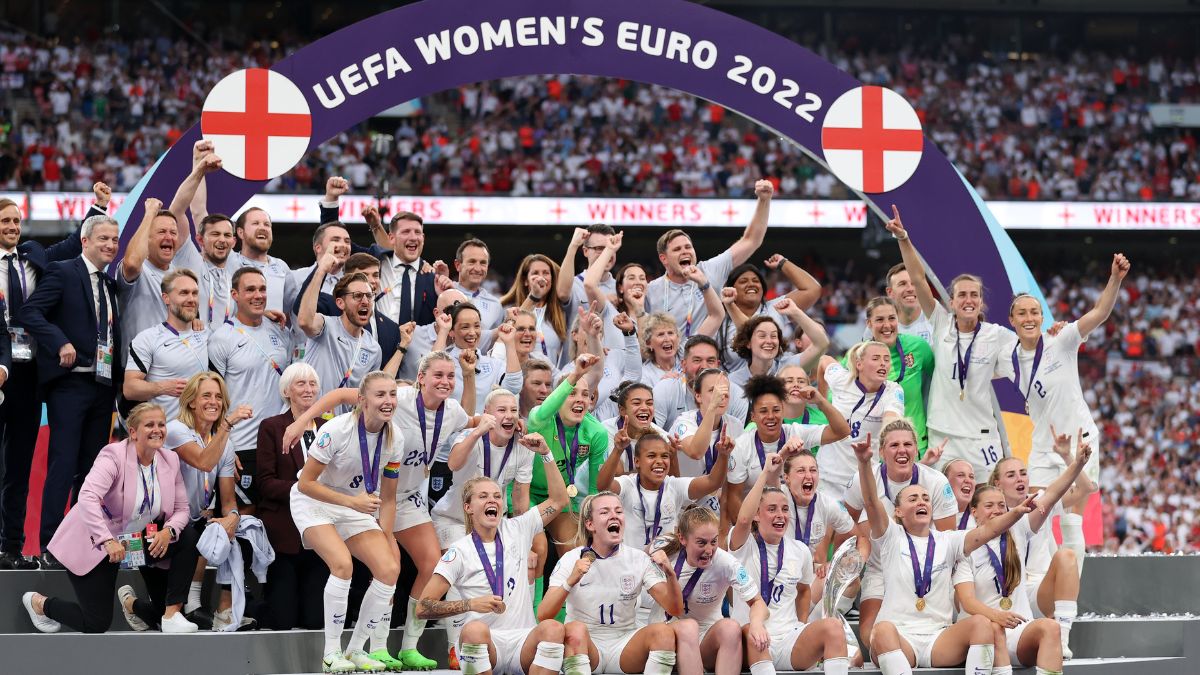
England Women’s win over Germany in the 2022 UEFA European Championships was watched by a peak TV audience of 17.4 million people and turned the squad into household names. Now, with the Women’s Super League attracting record crowds, brands have a new world of marketing opportunities to explore from advertising to multimillion-pound sponsorship deals.
Luca Russo, brother and agent of Lioness star Alessia, whose back-heel finish in the semi-final turned her into a viral star, says his phone hasn’t stopped ringing. “We’ve had a lot of interest from brands looking to work with Alessia – it’s an exciting time for her,” he says.
Russo isn’t the only England star attracting interest. Captain Leah Williamson has agreed deals with Gucci, Nike and Pepsi, while Lucy Bronze has also partnered with the fizzy drinks brand, plus EE and Visa.
Social media is likely to provide another avenue for brands and players to cash in on England’s sporting success. Chloe Kelly, who scored the extra-time winner in the final, saw her following surge from 150,000 followers at the start of the tournament to 413,000 at the time of writing. A study by Betting.com estimates that the Lionesses’ headline acts could command up to £1,500 for just a single sponsored post on Instagram.
Playing the long game
While sponsorship deals in the aftermath of the European Championships are likely to provide short-term returns for brands, could there be more value in pursuing long-term strategies within women’s sport?
Lisa Parfitt is co-founder of sports marketing agency The Space Between and thinks the answer to this is clear. “Our research last year found that fans of women’s sport are 25% more likely to purchase sponsor products than followers of men’s sport. Brand recall among fans of women’s sport is also twice as likely as it is among those who follow men’s sport.”
But, why is that? “Women’s sport has struggled for investment for such a long time that there is a genuine appreciation for a sponsor coming in and spending money,” says Parfitt. “Fans know how important that money is – because, even now, women’s football at the domestic level isn’t financially sustainable. In men’s sport, fans are used to there being so many brands because there are so many eyeballs – which means big visibility.”
With a surge of brands now expected to enter the market, though, competition for eyeballs will be fierce. So, how do they stand out from the crowd? “Brands need to understand their role,” says Parfitt. “They need to be clear about what it is they’re going to do to support the club or sport. A brand’s job isn’t to fund women’s football but they’ll reap bigger long-term benefits if they have a wider purpose.” That belief is based on data. The agency’s report also found that 50% of fans of women’s sport ‘strongly agree’ that sponsors should look ‘to make the world a better place’.
A brand’s job isn’t to fund women’s football but they’ll reap bigger long-term benefits if they have a wider purpose
In 2020, health and life insurance provider Vitality agreed a three-year deal to sponsor the women’s FA Cup, having already enjoyed success sponsoring a host of other female sport, including hockey, where their partnership with England hockey has resulted in a 122% increase in the number of local hockey clubs delivering Vitality Back to Hockey sessions between 2017 and 2021.
Alexa Chaffer, director of PR, content and social at Vitality, says: “Our entire sponsorship strategy is aligned with our core purpose, which is to make people healthier and enhance and protect their lives. With the FA Cup, the goal is to drive visibility of women’s football and inspire more girls and women to take up football or other sport and stay active.”
Purpose is also at the heart of Lewes FC’s new partnership with Xero. The online accounting software company agreed a three-year partnership with the Women’s Super League 2 club in July and plans to help the club create financial sustainability, working with local small businesses and accounting and bookkeeping communities. The investment will also allow the club to hire staff to deliver its strategy and communicate the importance of healthy finances to the grassroots club community.
Authentic partnerships
It isn’t only big brands that have grasped how to capture the attention of fans through authenticity. Women’s football clothing and sportswear brand Miss Kick has a brand story that resonates with every girl who has grown up wanting to play football. Founder and CEO Grace Vella says: “Growing up, I had to wear boys’ football and training kits – which were always too big. I wanted to create a clothing brand that inspired girls to play football.”
She and her team have invested time and money showcasing their clothing range to young girls and their parents at the grassroots level, which has resulted in a loyal band of online customers. Miss Kick also reinvests 2.5% of every sale into its Miss Kick Foundation, which provides free opportunities for girls to get into the sport.
Vella has signed up rising stars of the women’s game as ambassadors, including Liverpool’s Taylor Hinds and Hannah Cain at Leicester City. But partnering with the Lionesses could prove more difficult. “Most of the big-name players have deals with Adidas, Nike and other brands,” she explains. “As part of those deals, they can’t partner with other sportswear brands.”
For the Lionesses, the attention of global brands is likely to continue but Luca Russo says the partnerships need to be right. “It’s all about value,” he says. “We’re seeking long-term partnerships for Alessia. She’s young, she’s got a vast audience that’s bigger than a lot of big-name male players and is far more engaged.”
Russo and her teammates are at the beginning of an exciting four-year cycle with England that could witness a World Cup, another Euros and an Olympic Games, where more female athletes than ever are likely to be courted by big brands. Those that commit to long-term, authentic partnerships with a wider purpose to develop women’s sport are likely to win the hearts, minds and wallets of a new generation of fans of women’s sport.

England Women’s win over Germany in the 2022 UEFA European Championships was watched by a peak TV audience of 17.4 million people and turned the squad into household names. Now, with the Women’s Super League attracting record crowds, brands have a new world of marketing opportunities to explore from advertising to multimillion-pound sponsorship deals.
Luca Russo, brother and agent of Lioness star Alessia, whose back-heel finish in the semi-final turned her into a viral star, says his phone hasn’t stopped ringing. “We’ve had a lot of interest from brands looking to work with Alessia – it’s an exciting time for her,” he says.
Russo isn’t the only England star attracting interest. Captain Leah Williamson has agreed deals with Gucci, Nike and Pepsi, while Lucy Bronze has also partnered with the fizzy drinks brand, plus EE and Visa.





